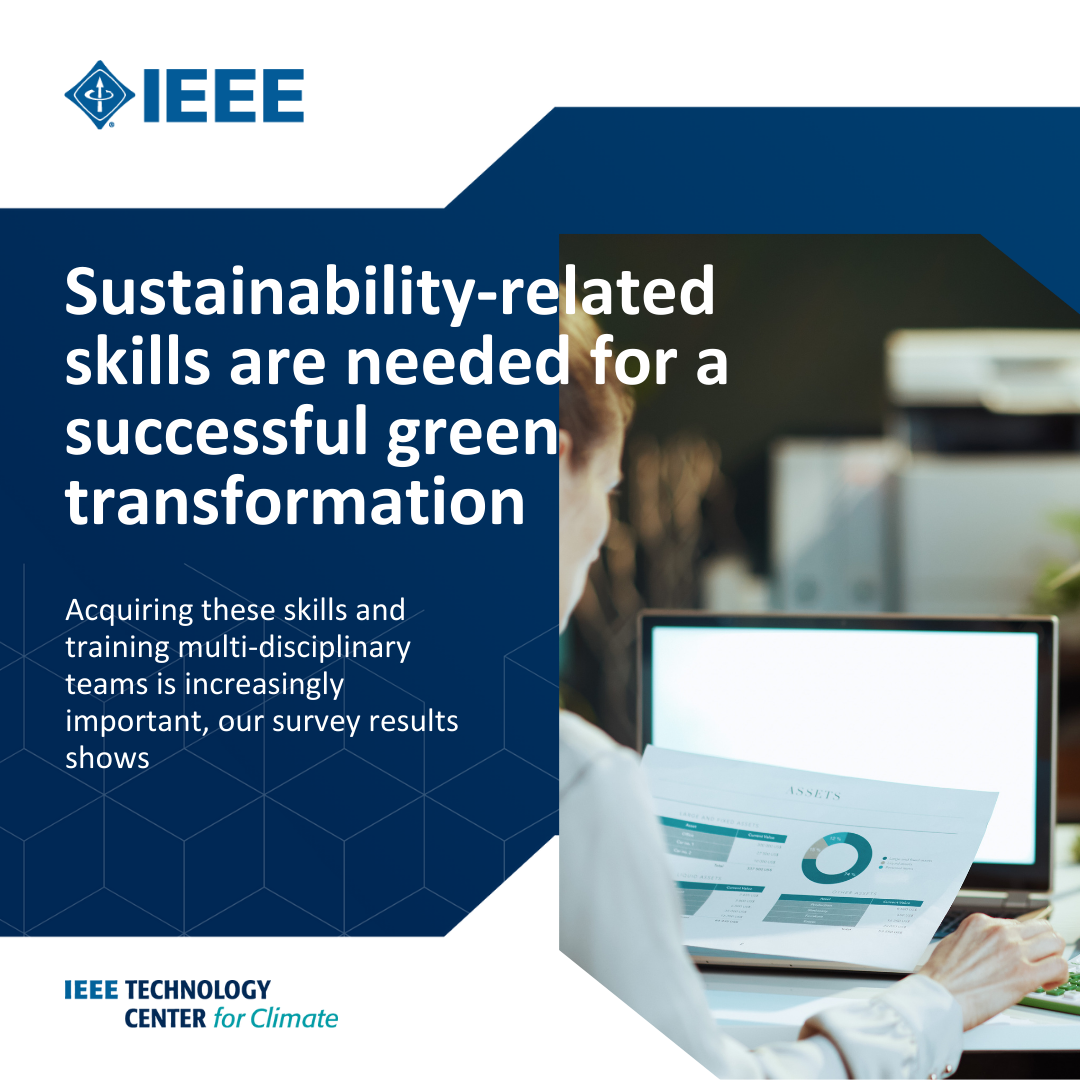Summary
The green transition is reshaping the workforce and talent pools globally. This is creating a growing demand for green skills and new profiles across industries. Public, private and educational partnerships will be needed to address this at scale.
Green skills are not just an emerging trend and confined to green jobs; they are becoming a fundamental necessity across all industries.
The growth in renewable energy and green industries alone has been projected to lead to 10.3 million net new jobs by 2030 and even grow to 22.7 million as demand for green industries increases.
This creates challenges, such as the need for a qualified workforce with skills to be acquired by training, reskilling or upskilling. New hires may be needed to guide and implement the sustainability strategy within a company, while existing profiles need to complement their technical or other skills with sustainability-related ones. In the energy sector for instance, jobs will require specific skills, from understanding cutting-edge diagnostic tools to environmental impact assessments and real-time data analysis.
While the shift to a greener economy means employment growth, making the most of this opportunity will require coordinated efforts and increased collaboration across academia, industry, public and international organizations.
Towards a convergence of skills for the green transformation
In some countries, we can already see a blending of environmental sustainability with skills development policies in the green transition. In countries such as Germany’s “Energiewende”, the skills development approach is sector-specific. Other countries such as Denmark and France adopt a cross sectoral approach which seems to be the key to a successful green transition.
This is reinforced by the findings of the LinkedIn Global Green Skills Report 2022: the fastest growing jobs requiring green skills are not traditionally green jobs, but people working in compliance, facilities and sales. In short, a greener workforce requires a mix of people and profiles from engineering, environment, policy, legal, communications, technical and other skills to address the implications of the green transition within existing roles.
As a result, the need for green skills eventually affects nearly every role within an organization. In an ITCC survey, more than two-thirds of respondents think they have to acquire new skills for the green transformation. Over 80% believe there should be an understanding related to sustainability even in technical profiles.




Similar to the digital skills which have become integral across most job functions, green skills are becoming critically important and moving from emerging niche to mainstream competency.
In times where digital transformation is so high on industries’ agenda, simply going digital or only focusing on digital skills is not enough. They must now also incorporate sustainability in their strategy, and the integration of digital technologies for efficiency should also consider environmental impact. As organizations digitize their supply chains, for example, they must also assess and implement practices that reduce carbon footprint and optimize resource use. From product design and development through manufacturing and end-of-life stages, industries now have to factor aspects of environmental impact, including: material choice and sourcing, energy consumption during production, along with ways to ensure sustainability without sacrificing on quality and performance.
This requires a skill set beyond purely digital capabilities. As roles evolve to incorporate more skills relating to sustainability and the environment, so industries can combine these with digital skills, leading to more efficient and sustainable operations.
How do we train and empower the green workforce?
The growing attractivity of sustainability and green jobs is a driving force for newcomers on the job markets. Between 52-77% of people aged 15-39 say a job in the green economy is important to them. Employers also start seeing impacts on hiring. In a KPMG survey on “climate quitting”, one in five 18–44 year-olds in the UK have rejected a job offer based on a poor environmental, social and governance (ESG) record.
Enthusiasm for green jobs and related green talent in the workforce is rising worldwide, but demand will soon outstrip supply. So how do we make sure all prospective employees have the required knowledge and skills in technology and sustainability?
One way to ensure sustainability throughout the value chain is to create multidisciplinary teams with cross-cutting knowledge and skills, as found in the ITCC Survey on Technical Skills for a Sustainable Workforce. The survey respondents also highlighted the need for teams with deep domain expertise, coupled with knowledge in other areas – what is known as a ‘T’ profile. An example of professional adaptation in the evolving job market can be seen in positions traditionally not associated with sustainability. An accountant, for example, may need to develop skills in carbon footprint assessments and sustainability reporting standards to remain relevant and competitive in their profession.
Partnerships can provide a springboard to global green workforce transformation
Workforce planning exercises can help identify sustainability skills gaps and blindspots that need attention. Public and private sector can work with professional associations like IEEE to help create a learning environment to support workforce profiles by integrating training programs, or establishing networking groups.
These partnerships are needed if we are to scale-up the green workforce, especially for small to medium size enterprises (SMEs), which provide nearly 70% of jobs and GDP worldwide.
“SMEs face specific challenges. It’s more difficult for them to have access to capital, to invest in training their workforce, and to be able to comply with these new regulations. If we don’t support them, there’s a risk that we simply push the problem further away.” said Matthias Larsen, Industrial Development Expert at the United Nations Industrial Development Organization (UNIDO) during the ITCC webinar The Technical Workforce for a Sustainable Future.
Acting now for a sustainable planet and business
There is a clear demand for green skills in the workforce that need to be urgently met.
Beyond the contribution to a greener future, companies and organizations should consider how to attract and retain talent who prioritize sustainability and work on retraining and upskilling their own workers. This can lead to long-term impact on both their business success and the health of the planet. The key to this success will be building partnerships and collaborations between academia, industry, public and international organizations.
- We explored how specific strategies for recruitment and planning can ensure people with the right skills and profiles will sustain a ‘green transition’ workforce in a net zero future in our recent webinar on The Technical Workforce for a Sustainable Future, the fourth in the IEEE webinar series Empowering the Green Tech Revolution: From Design to Deployment. [watch here]
Survey
We’d like to hear from you on this topic!
Where do you see the limits and challenges in skilling and upskilling the workforce for climate?
⬇ Let us know below ⬇


